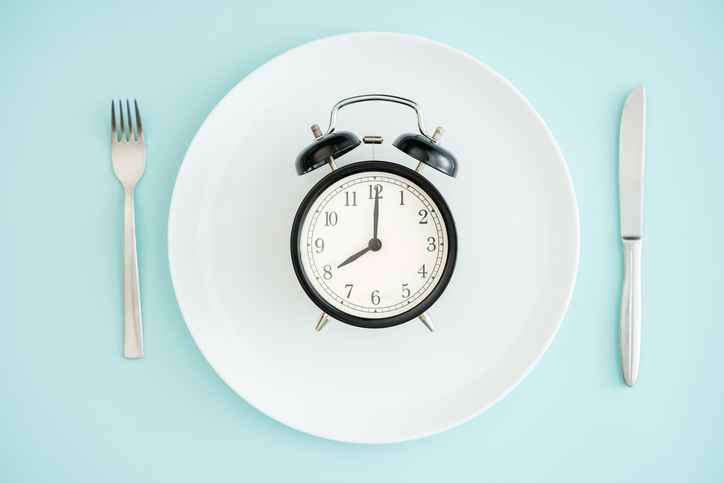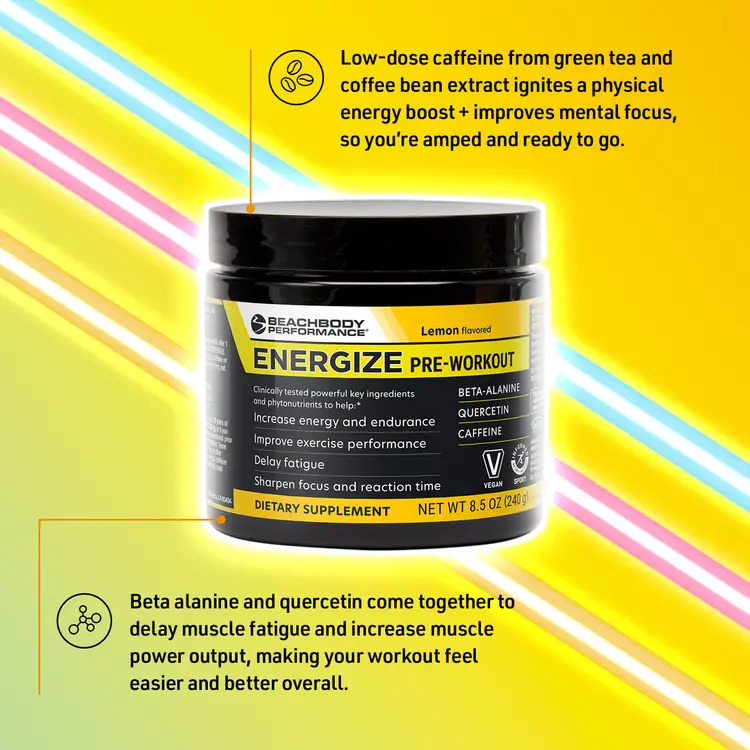Does Pre-Workout Break a Fast?

If you’re following an intermittent fasting diet, you may wonder, “Does pre-workout break a fast?” Let’s find out.
One of the benefits of intermittent fasting is simplicity. You don’t count anything: no calories, carbs, nor grains of salt. All you do is watch the clock, then schedule your meals so that, at regular intervals, you eat nothing at all. The timing varies — some people skip whole days of eating, others fast during set hours each day — but the concept is the same:
- Eat for a while.
- Then, during your fasts, stop.
Inevitably, though, people have questions — especially when their fasting schedule contradicts other fitness-boosting practices like consuming enough protein or fueling your body with adequate carbs.
Or taking a supplement like Beachbody Performance Energize before a training session.
So let’s break it down: Does pre-workout break a fast? And, if it does, how should you incorporate it into an intermittent fasting schedule?
What Is a Fast?

“Fasting, in its simplest definition, is refraining from food or drink,” says Krista Maguire, RD. Water, plain tea, and black coffee are okay during a fast because they have zero calories. There’s some debate over diet colas, but technically zero-calorie drinks don’t break your fast either. All food is out.
“Fasting comes in many forms,” says Maguire. “Intermittent fasting (IF) can refer to certain days with little to no food or in the form of what we call time-restricted feeding, which is going a certain number of hours without food each day.”
Intermittent fasting, unsurprisingly, usually leads to weight loss, primarily because over the course of a given week, you’re eating much less than usual. For example, in a 16:8 fast (fast for 16 hours, then eat all your meals in the remaining eight-hour window), most people eat much less in their feeding window than they would over a day when their eating wasn’t time-restricted. Over weeks and months, you wind up eating less than you usually would — and weight loss is the obvious outcome.
IF adherents claim that this approach confers benefits beyond what can be achieved simply by eating a little less at every meal. Some argue that long fasts improve our ability to access fat stores or improve our ability to clear sugars from the bloodstream. However, these larger claims remain speculative.
“As far as heart health, blood sugar management, gut health, and other health benefits, the jury is still out,” says Maguire.
The main draw of the diet is that it’s relatively foolproof: don’t eat, lose weight. That’s still good news, though. Some people seeking to lose weight prefer an IF approach over the more standard practice, and the science suggests that both methods work.
Will Beachbody Performance Energize Break a Fast?
Technically, yes.
Beachbody Performance Energize contains 20 calories per scoop, so taking a serving — or even a part of a serving — means you’re no longer fasting. That’s the short answer.
The longer answer, however, is a resounding yes, but…
Is breaking a fast really such a bad thing? Not necessarily. As noted, most of the benefits of IF come from the fact that, over time, you are eating less than you usually would — the other benefits are speculative.
“There’s not a lot of hard and fast data out there showing that a certain number of calories during this fasting window will help or hinder any health benefits,” says Maguire.
Arguably, if you’re hungry from a long fast, a pre-workout drink before your gym session could give you the energy you need to put in a good workout. When fueled by Beachbody Performance Energize or a pre-workout snack, you’re setting yourself up to potentially burn more calories than are contained in the pre-workout snack or supplement itself.
Plus, you’ll have the fuel and energy you need to lift heavier and possibly build more muscle. The net result is a far more productive session than you might’ve had if you hadn’t consumed a few calories beforehand.*
If you really want to do IF by the book, however, consider working out at the beginning or end of a fasting window, so that taking a pre-workout supplement beforehand — or a nourishing post-workout meal afterwards — does not break a fast you’d rather extend.
Alternatively, choose a workout modality — like walking or low-intensity cardio — that relies less on stored carbohydrates, and your performance won’t suffer during the workout.
Finally, know that even some pros would likely let a mid-fast serving of Beachbody Performance Energize slide. “Some experts say that eating a low-calorie food or beverage under around 50 calories or so is okay during a fasting window as long as it doesn’t spike your blood sugar,” says Maguire.
Ingredients in Beachbody Performance Energize That Won’t Break a Fast

Some of the ingredients in Beachbody Performance Energize contain calories — mostly carbohydrates — and therefore do break a fast: Organic cane sugar is a carbohydrate, which delivers about four calories per gram.
But the other ingredients in Beachbody Performance Energize — including beta-alanine, quercetin, silica, citric acid, and others — contain little to no calories at all.
Big picture: If losing fat, building muscle, and becoming healthy and strong are your fitness goals, the small number of calories in Beachbody Performance Energize should not deter you from taking it. In the long term, you could reach these goals faster by nourishing your body with a pre-workout supplement than by extending your fast by another hour or two. The pros far outweigh any cons.*
Finally, remember it’s always a good idea to consult your physician before beginning any diet or exercise program.
*These statements have not been evaluated by the Food and Drug Administration. This product is not intended to diagnose, treat, cure, or prevent any disease.
